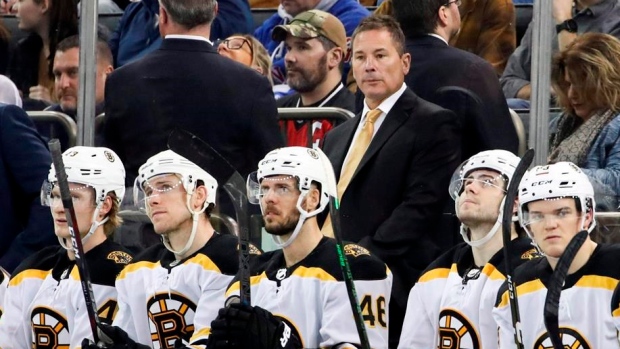May 10, 2020
Like their players, NHL coaches trying to stay sharp during pandemic pause
Bruce Cassidy loves the NHL's daily grind. But like many people mostly confined to their homes or apartments during the COVID-19 pandemic, even Cassidy, whose team sat first in the NHL standings when the NHL paused its season March 12, has found it difficult to find motivation with the days bleeding into one another.
The Canadian Press

Bruce Cassidy loves the NHL's daily grind.
The preparation, the teaching, the competition, the pressure.
Rinse. Repeat.
"When you're under duress and you've got a structured schedule — bang — you're hammering things out during the year," said the head coach of the Boston Bruins. "Everything's got a timeline and you have to be efficient."
But like many people mostly confined to their homes or apartments during the COVID-19 pandemic, even Cassidy, whose team sat first in the NHL standings when the NHL paused its season March 12, has found it difficult to find motivation with the days bleeding into one another.
"The saying goes, 'Nothing to do and all day to do it,'" he added with a laugh during a recent interview. "All of a sudden the day's gone. You've got two things to do. You finally get through one and you're like, 'Well, I don't have time to do the other thing.'
"It's like, 'I'll just put that aside, I'll start reading the paper a bit.' This or that grabs your attention. You lose a bit of that part of it, you're concentration."
A lot has been made about how hockey players have been trying to keep in shape with home workouts since the novel coronavirus outbreak forced the league to suspend its schedule nearly two months ago.
Coaches are also doing their best to stay sharp.
Some teams assigned their staffs projects and due dates, while others took more of a laissez-fair, work-at-your-own pace approach after it became clear the stoppage would last for some time.
If the games do resume this summer — the league is looking at a number of options for a return to play if governments give the green light — there's work to do on potential playoff opponents, talent evaluation and areas to improve.
Columbus Blue Jackets assistant Brad Shaw, one of a number of bench bosses to present a video seminar as part of the new online mentorship program run by the NHL Coaches' Association during the pandemic, said he's already completed a lot of the tasks usually reserved for the off-season.
The former defenceman broke down his team's penalty kill, as well as the schemes used by the top short-handed and power-play units around the league.
"I'm seeing if there's things we can borrow and things to be ready for," Shaw said. "But it's a little tough not having a real timeline or deadline. That's kind of curtailed the motivation some days."
Winnipeg Jets counterpart Jamie Kompon has had some of the same feelings, but has forced himself to push through the work.
"Where can we get better to simplify our game to make it more effective?" he said. "I spent the first three or four weeks watching video. You start seeing things repetitively. How can we make drills so we can improve on this? If we do come back, then it's going to be a sprint to the end.
"We want to make sure that we give ourselves the best chance."
Toronto Maple Leafs head coach Sheldon Keefe, who was 47 games into his career behind an NHL bench when the pandemic hit, said there's a professional responsibility to be ready.
"The circumstances are difficult for everybody in the world, but our season is not complete," he said. "We have to take advantage of every day that we have to work towards being better versions of ourselves."
And while some players have taken up juggling or another new hobby, coaches have also found other ways to remain active during this era of self-isolation and physical distancing.
"My buddy's a handyman," Kompon said. "He asked me if I could help him out. I go, 'Hey, I've got lots of time.' I'm learning a different trade. I've been helping renovate a cottage.
"It's nice to get out of the house. You're learning about life after hockey because coaches are only as good as their last game."
Montreal Canadiens assistant Kirk Muller, meanwhile, has been home in Kingston, Ont., during the spring for the first time in 15 years.
"I've been mister outdoorsman," he said. "I've been working on the property, cutting trees, weeding.
"I have two of my daughters with me and I have my grandson here ... it's been busy, I haven't been bored."
Cassidy, who assigned different tasks for his staff without hard deadlines, said the unknown makes the situation difficult from a coaching perspective. If the NHL eventually get the go-ahead, how many players will be allowed on the ice for those initial practices? Will there be regular-season games? Will the league go right into the playoffs? Will the usual 16-team post-season bracket be expanded?
"It's not like I'm telling (my assistants) something has to be done by 3 p.m. today," he said. "It's just stuff on their own that they need to know. They need to be up to speed. Once we get back to work you'd rather focus on the present, which would be, 'Let's get our players ready. How are we going to do that?'
"Instead of trying to catch up on the New York Islanders' neutral zone play later, we have plenty of time to do that now."
He also knows there's a chance a lot of work done during the hiatus may never see the light of day.
"I guess if nothing happens, then nothing happens," Cassidy said. "It'll all just go in a folder and be ready to go next season."
This report by The Canadian Press was first published May 10, 2020.
___
Follow @JClipperton_CP on Twitter

